- Home
- Henry James
The Bostonians, Vol. I Page 3
The Bostonians, Vol. I Read online
Page 3
"Well, perhaps, after all, I have a general idea," he confessed; "but don't you see how this little reunion will give me a chance to fix it?"
She lingered an instant, with her anxious face. "Mrs. Farrinder will fix it!" she said; and she went to prepare herself.
It was in this poor young lady's nature to be anxious, to have scruple within scruple and to forecast the consequences of things. She returned in ten minutes, in her bonnet, which she had apparently assumed in recognition of Miss Birdseye's asceticism. As she stood there drawing on her gloves—her visitor had fortified himself against Mrs. Farrinder by another glass of wine—she declared to him that she quite repented of having proposed to him to go; something told her that he would be an unfavourable element.
"Why, is it going to be a spiritual séance?" Basil Ransom asked.
"Well, I have heard at Miss Birdseye's some inspirational speaking." Olive Chancellor was determined to look him straight in the face as she said this; her sense of the way it might strike him operated as a cogent, not as a deterrent, reason.
"Why, Miss Olive, it's just got up on purpose for me!" cried the young Mississippian, radiant, and clasping his hands. She thought him very handsome as he said this, but reflected that unfortunately men didn't care for the truth, especially the new kinds, in proportion as they were good-looking. She had, however, a moral resource that she could always fall back upon; it had already been a comfort to her, on occasions of acute feeling, that she hated men, as a class, anyway. "And I want so much to see an old Abolitionist; I have never laid eyes on one," Basil Ransom added.
"Of course you couldn't see one in the South; you were too afraid of them to let them come there!" She was now trying to think of something she might say that would be sufficiently disagreeable to make him cease to insist on accompanying her; for, strange to record—if anything, in a person of that intense sensibility, be stranger than any other—her second thought with regard to having asked him had deepened with the elapsing moments into an unreasoned terror of the effect of his presence. "Perhaps Miss Birdseye won't like you," she went on, as they waited for the carriage.
"I don't know; I reckon she will," said Basil Ransom good-humouredly. He evidently had no intention of giving up his opportunity.
From the window of the dining-room, at that moment, they heard the carriage drive up. Miss Birdseye lived at the South End; the distance was considerable, and Miss Chancellor had ordered a hackney-coach, it being one of the advantages of living in Charles Street that stables were near. The logic of her conduct was none of the clearest; for if she had been alone she would have proceeded to her destination by the aid of the street-car; not from economy (for she had the good fortune not to be obliged to consult it to that degree), and not from any love of wandering about Boston at night (a kind of exposure she greatly disliked), but by reason of a theory she devotedly nursed, a theory which bade her put off invidious differences and mingle in the common life. She would have gone on foot to Boylston Street, and there she would have taken the public conveyance (in her heart she loathed it) to the South End. Boston was full of poor girls who had to walk about at night and to squeeze into horse-cars in which every sense was displeased; and why should she hold herself superior to these? Olive Chancellor regulated her conduct on lofty principles, and this is why, having to-night the advantage of a gentleman's protection, she sent for a carriage to obliterate that patronage. If they had gone together in the common way she would have seemed to owe it to him that she should be so daring, and he belonged to a sex to which she wished to be under no obligations. Months before, when she wrote to him, it had been with the sense, rather, of putting him in debt. As they rolled toward the South End, side by side, in a good deal of silence, bouncing and bumping over the railway-tracks very little less, after all, than if their wheels had been fitted to them, and looking out on either side at rows of red houses, dusky in the lamp-light, with protuberant fronts, approached by ladders of stone; as they proceeded, with these contemplative undulations, Miss Chancellor said to her companion, with a concentrated desire to defy him, as a punishment for having thrown her (she couldn't tell why) into such a tremor:
"Don't you believe, then, in the coming of a better day—in its being possible to do something for the human race?"
Poor Ransom perceived the defiance, and he felt rather bewildered; he wondered what type, after all, he had got hold of, and what game was being played with him. Why had she made advances, if she wanted to pinch him this way? However, he was good for any game—that one as well as another—and he saw that he was "in" for something of which he had long desired to have a nearer view. "Well, Miss Olive," he answered, putting on again his big hat, which he had been holding in his lap, "what strikes me most is that the human race has got to bear its troubles."
"That's what men say to women, to make them patient in the position they have made for them."
"Oh, the position of women!" Basil Ransom exclaimed. "The position of women is to make fools of men. I would change my position for yours any day," he went on. "That's what I said to myself as I sat there in your elegant home."
He could not see, in the dimness of the carriage, that she had flushed quickly, and he did not know that she disliked to be reminded of certain things which, for her, were mitigations of the hard feminine lot. But the passionate quaver with which, a moment later, she answered him sufficiently assured him that he had touched her at a tender point.
"Do you make it a reproach to me that I happen to have a little money? The dearest wish of my heart is to do something with it for others—for the miserable."
Basil Ransom might have greeted this last declaration with the sympathy it deserved, might have commended the noble aspirations of his kinswoman. But what struck him, rather, was the oddity of so sudden a sharpness of pitch in an intercourse which, an hour or two before, had begun in perfect amity, and he burst once more into an irrepressible laugh. This made his companion feel, with intensity, how little she was joking. "I don't know why I should care what you think," she said.
"Don't care—don't care. What does it matter? It is not of the slightest importance."
He might say that, but it was not true; she felt that there were reasons why she should care. She had brought him into her life, and she should have to pay for it. But she wished to know the worst at once. "Are you against our emancipation?" she asked, turning a white face on him in the momentary radiance of a street-lamp.
"Do you mean your voting and preaching and all that sort of thing?" He made this inquiry, but seeing how seriously she would take his answer, he was almost frightened, and hung fire. "I will tell you when I have heard Mrs. Farrinder."
They had arrived at the address given by Miss Chancellor to the coachman, and their vehicle stopped with a lurch. Basil Ransom got out; he stood at the door with an extended hand, to assist the young lady. But she seemed to hesitate; she sat there with her spectral face. "You hate it!" she exclaimed, in a low tone.
"Miss Birdseye will convert me," said Ransom, with intention; for he had grown very curious, and he was afraid that now, at the last, Miss Chancellor would prevent his entering the house. She alighted without his help, and behind her he ascended the high steps of Miss Birdseye's residence. He had grown very curious, and among the things he wanted to know was why in the world this ticklish spinster had written to him.
IV
She had told him before they started that they should be early; she wished to see Miss Birdseye alone, before the arrival of any one else. This was just for the pleasure of seeing her—it was an opportunity; she was always so taken up with others. She received Miss Chancellor in the hall of the mansion, which had a salient front, an enormous and very high number—756—painted in gilt on the glass light above the door, a tin sign bearing the name of a doctress (Mary J. Prance) suspended from one of the windows of the basement, and a peculiar look of being both new and faded—a kind of modern fatigue—like certain articles of commerce which are sold at a reductio
n as shop-worn. The hall was very narrow; a considerable part of it was occupied by a large hat-tree, from which several coats and shawls already depended; the rest offered space for certain lateral demonstrations on Miss Birdseye's part. She sidled about her visitors, and at last went round to open for them a door of further admission, which happened to be locked inside. She was a little old lady, with an enormous head; that was the first thing Ransom noticed—the vast, fair, protuberant, candid, ungarnished brow, surmounting a pair of weak, kind, tired-looking eyes, and ineffectually balanced in the rear by a cap which had the air of falling backward, and which Miss Birdseye suddenly felt for while she talked, with unsuccessful irrelevant movements. She had a sad, soft, pale face, which (and it was the effect of her whole head) looked as if it had been soaked, blurred, and made vague by exposure to some slow dissolvent. The long practice of philanthropy had not given accent to her features; it had rubbed out their transitions, their meanings. The waves of sympathy, of enthusiasm, had wrought upon them in the same way in which the waves of time finally modify the surface of old marble busts, gradually washing away their sharpness, their details. In her large countenance her dim little smile scarcely showed. It was a mere sketch of a smile, a kind of instalment, or payment on account; it seemed to say that she would smile more if she had time, but that you could see, without this, that she was gentle and easy to beguile.
She always dressed in the same way: she wore a loose black jacket, with deep pockets, which were stuffed with papers, memoranda of a voluminous correspondence; and from beneath her jacket depended a short stuff dress. The brevity of this simple garment was the one device by which Miss Birdseye managed to suggest that she was a woman of business, that she wished to be free for action. She belonged to the Short-Skirts League, as a matter of course; for she belonged to any and every league that had been founded for almost any purpose whatever. This did not prevent her being a confused, entangled, inconsequent, discursive old woman, whose charity began at home and ended nowhere, whose credulity kept pace with it, and who knew less about her fellow-creatures, if possible, after fifty years of humanitary zeal, than on the day she had gone into the field to testify against the iniquity of most arrangements. Basil Ransom knew very little about such a life as hers, but she seemed to him a revelation of a class, and a multitude of socialistic figures, of names and episodes that he had heard of, grouped themselves behind her. She looked as if she had spent her life on platforms, in audiences, in conventions, in phalansteries, in séances; in her faded face there was a kind of reflexion of ugly lecture-lamps; with its habit of an upward angle, it seemed turned toward a public speaker, with an effort of respiration in the thick air in which social reforms are usually discussed. She talked continually, in a voice of which the spring seemed broken, like that of an over-worked bell-wire; and when Miss Chancellor explained that she had brought Mr. Ransom because he was so anxious to meet Mrs. Farrinder, she gave the young man a delicate, dirty, democratic little hand, looking at him kindly, as she could not help doing, but without the smallest discrimination as against others who might not have the good fortune (which involved, possibly, an injustice) to be present on such an interesting occasion. She struck him as very poor, but it was only afterward that he learned she had never had a penny in her life. No one had an idea how she lived; whenever money was given her she gave it away to a negro or a refugee. No woman could be less invidious, but on the whole she preferred these two classes of the human race. Since the Civil War much of her occupation was gone; for before that her best hours had been spent in fancying that she was helping some Southern slave to escape. It would have been a nice question whether, in her heart of hearts, for the sake of this excitement, she did not sometimes wish the blacks back in bondage. She had suffered in the same way by the relaxation of many European despotisms, for in former years much of the romance of her life had been in smoothing the pillow of exile for banished conspirators. Her refugees had been very precious to her; she was always trying to raise money for some cadaverous Pole, to obtain lessons for some shirtless Italian. There was a legend that an Hungarian had once possessed himself of her affections, and had disappeared after robbing her of everything she possessed. This, however, was very apocryphal, for she had never possessed anything, and it was open to grave doubt that she could have entertained a sentiment so personal. She was in love, even in those days, only with causes, and she languished only for emancipations. But they had been the happiest days, for when causes were embodied in foreigners (what else were the Africans?), they were certainly more appealing.
She had just come down to see Doctor Prance—to see whether she wouldn't like to come up. But she wasn't in her room, and Miss Birdseye guessed she had gone out to her supper; she got her supper at a boarding-table about two blocks off. Miss Birdseye expressed the hope that Miss Chancellor had had hers; she would have had plenty of time to take it, for no one had come in yet; she didn't know what made them all so late. Ransom perceived that the garments suspended to the hat-rack were not a sign that Miss Birdseye's friends had assembled; if he had gone a little further still he would have recognised the house as one of those in which mysterious articles of clothing are always hooked to something in the hall. Miss Birdseye's visitors, those of Doctor Prance, and of other tenants—for Number 756 was the common residence of several persons, among whom there prevailed much vagueness of boundary—used to leave things to be called for; many of them went about with satchels and reticules, for which they were always looking for places of deposit. What completed the character of this interior was Miss Birdseye's own apartment, into which her guests presently made their way, and where they were joined by various other members of the good lady's circle. Indeed, it completed Miss Birdseye herself, if anything could be said to render that office to this essentially formless old woman, who had no more outline than a bundle of hay. But the bareness of her long, loose, empty parlour (it was shaped exactly like Miss Chancellor's) told that she had never had any needs but moral needs, and that all her history had been that of her sympathies. The place was lighted by a small hot glare of gas, which made it look white and featureless. It struck even Basil Ransom with its flatness, and he said to himself that his cousin must have a very big bee in her bonnet to make her like such a house. He did not know then, and he never knew, that she mortally disliked it, and that in a career in which she was constantly exposing herself to offence and laceration, her most poignant suffering came from the injury of her taste. She had tried to kill that nerve, to persuade herself that taste was only frivolity in the disguise of knowledge; but her susceptibility was constantly blooming afresh and making her wonder whether an absence of nice arrangements were a necessary part of the enthusiasm of humanity. Miss Birdseye was always trying to obtain employment, lessons in drawing, orders for portraits, for poor foreign artists, as to the greatness of whose talent she pledged herself without reserve; but in point of fact she had not the faintest sense of the scenic or plastic side of life.
Toward nine o'clock the light of her hissing burners smote the majestic person of Mrs. Farrinder, who might have contributed to answer that question of Miss Chancellor's in the negative. She was a copious, handsome woman, in whom angularity had been corrected by the air of success; she had a rustling dress (it was evident what she thought about taste), abundant hair of a glossy blackness, a pair of folded arms, the expression of which seemed to say that rest, in such a career as hers, was as sweet as it was brief, and a terrible regularity of feature. I apply that adjective to her fine placid mask because she seemed to face you with a question of which the answer was preordained, to ask you how a countenance could fail to be noble of which the measurements were so correct. You could contest neither the measurements nor the nobleness, and had to feel that Mrs. Farrinder imposed herself. There was a lithographic smoothness about her, and a mixture of the American matron and the public character. There was something public in her eye, which was large, cold, and quiet; it had acquired a sort of exposed reticence fro
m the habit of looking down from a lecture-desk, over a sea of heads, while its distinguished owner was eulogised by a leading citizen. Mrs. Farrinder, at almost any time, had the air of being introduced by a few remarks. She talked with great slowness and distinctness, and evidently a high sense of responsibility; she pronounced every syllable of every word and insisted on being explicit. If, in conversation with her, you attempted to take anything for granted, or to jump two or three steps at a time, she paused, looking at you with a cold patience, as if she knew that trick, and then went on at her own measured pace. She lectured on temperance and the rights of women; the ends she laboured for were to give the ballot to every woman in the country and to take the flowing bowl from every man. She was held to have a very fine manner, and to embody the domestic virtues and the graces of the drawing-room; to be a shining proof, in short, that the forum, for ladies, is not necessarily hostile to the fireside. She had a husband, and his name was Amariah.
Doctor Prance had come back from supper and made her appearance in response to an invitation that Miss Birdseye's relaxed voice had tinkled down to her from the hall over the banisters, with much repetition, to secure attention. She was a plain, spare young woman, with short hair and an eye-glass; she looked about her with a kind of near-sighted deprecation, and seemed to hope that she should not be expected to generalise in any way, or supposed to have come up for any purpose more social than to see what Miss Birdseye wanted this time. By nine o'clock twenty other persons had arrived, and had placed themselves in the chairs that were ranged along the sides of the long, bald room, in which they ended by producing the similitude of an enormous street-car. The apartment contained little else but these chairs, many of which had a borrowed aspect, an implication of bare bedrooms in the upper regions; a table or two with a discoloured marble top, a few books, and a collection of newspapers piled up in corners. Ransom could see for himself that the occasion was not crudely festive; there was a want of convivial movement, and, among most of the visitors, even of mutual recognition. They sat there as if they were waiting for something; they looked obliquely and silently at Mrs. Farrinder, and were plainly under the impression that, fortunately, they were not there to amuse themselves. The ladies, who were much the more numerous, wore their bonnets, like Miss Chancellor; the men were in the garb of toil, many of them in weary-looking overcoats. Two or three had retained their overshoes, and as you approached them the odour of the india-rubber was perceptible. It was not, however, that Miss Birdseye ever noticed anything of that sort; she neither knew what she smelled nor tasted what she ate. Most of her friends had an anxious, haggard look, though there were sundry exceptions—half-a-dozen placid, florid faces. Basil Ransom wondered who they all were; he had a general idea they were mediums, communists, vegetarians. It was not, either, that Miss Birdseye failed to wander about among them with repetitions of inquiry and friendly absences of attention; she sat down near most of them in turn, saying "Yes, yes," vaguely and kindly, to remarks they made to her, feeling for the papers in the pockets of her loosened bodice, recovering her cap and sacrificing her spectacles, wondering most of all what had been her idea in convoking these people. Then she remembered that it had been connected in some way with Mrs. Farrinder; that this eloquent woman had promised to favour the company with a few reminiscences of her last campaign; to sketch even, perhaps, the lines on which she intended to operate during the coming winter. This was what Olive Chancellor had come to hear; this would be the attraction for the dark-eyed young man (he looked like a genius) she had brought with her. Miss Birdseye made her way back to the great lecturess, who was bending an indulgent attention on Miss Chancellor; the latter compressed into a small space, to be near her, and sitting with clasped hands and a concentration of inquiry which by contrast made Mrs. Farrinder's manner seem large and free. In her transit, however, the hostess was checked by the arrival of fresh pilgrims; she had no idea she had mentioned the occasion to so many people—she only remembered, as it were, those she had forgotten—and it was certainly a proof of the interest felt in Mrs. Farrinder's work. The people who had just come in were Doctor and Mrs. Tarrant and their daughter Verena; he was a mesmeric healer and she was of old Abolitionist stock. Miss Birdseye rested her dim, dry smile upon the daughter, who was new to her, and it floated before her that she would probably be remarkable as a genius; her parentage was an implication of that. There was a genius for Miss Birdseye in every bush. Selah Tarrant had effected wonderful cures; she knew so many people—if they would only try him. His wife was a daughter of Abraham Greenstreet; she had kept a runaway slave in her house for thirty days. That was years before, when this girl must have been a child; but hadn't it thrown a kind of rainbow over her cradle, and wouldn't she naturally have some gift? The girl was very pretty, though she had red hair.

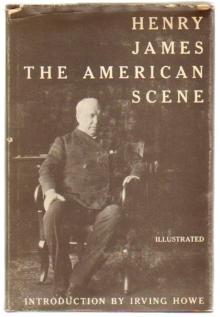 The American
The American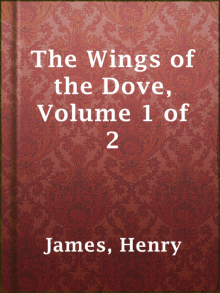 The Wings of the Dove, Volume 1 of 2
The Wings of the Dove, Volume 1 of 2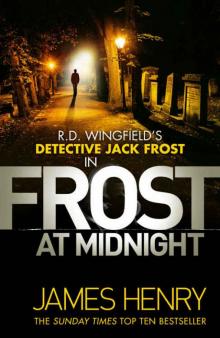 Frost at Midnight
Frost at Midnight Morning Frost
Morning Frost The Portrait of a Lady — Volume 1
The Portrait of a Lady — Volume 1 Fatal Frost
Fatal Frost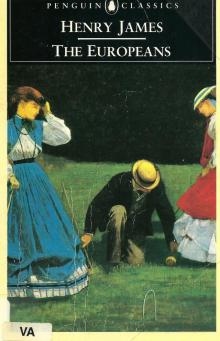 The Europeans
The Europeans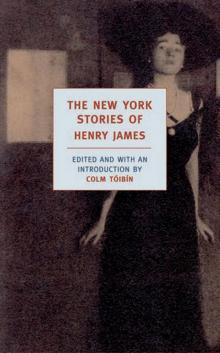 The New York Stories of Henry James
The New York Stories of Henry James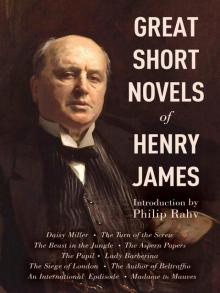 Great Short Novels of Henry James
Great Short Novels of Henry James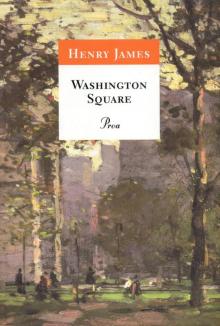 Washington Square
Washington Square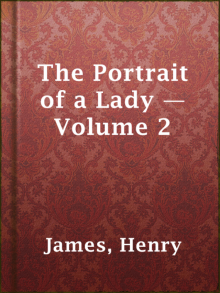 The Portrait of a Lady — Volume 2
The Portrait of a Lady — Volume 2 The Ambassadors
The Ambassadors The Wings of the Dove
The Wings of the Dove The Princess Casamassima (Classics)
The Princess Casamassima (Classics) The Coxon Fund
The Coxon Fund First Frost
First Frost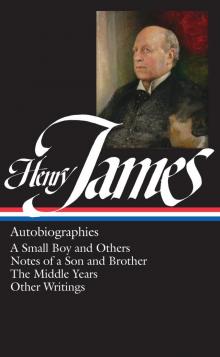 Henry James
Henry James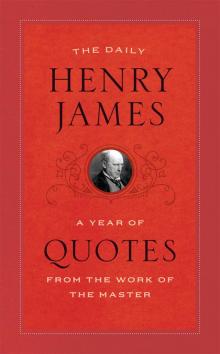 The Daily Henry James
The Daily Henry James Travels With Henry James
Travels With Henry James The Reverberator: A Novel
The Reverberator: A Novel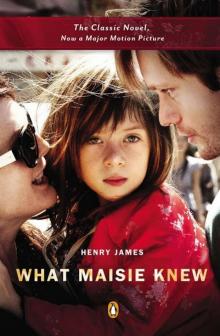 What Maisie Knew (Henry James Collection)
What Maisie Knew (Henry James Collection)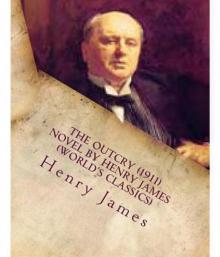 The Outcry
The Outcry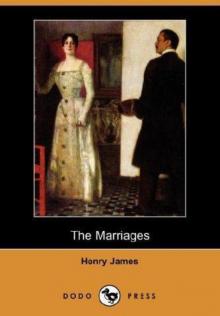 The Marriages
The Marriages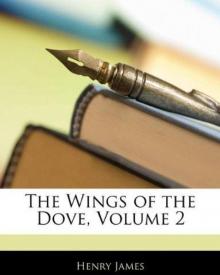 The Wings of the Dove, Volume 2
The Wings of the Dove, Volume 2 The Bostonians, Vol. I
The Bostonians, Vol. I The Outcry: -1911
The Outcry: -1911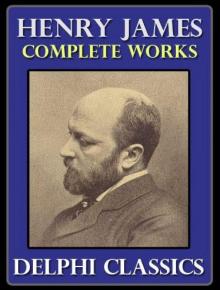 The Complete Works of Henry James
The Complete Works of Henry James Letters from the Palazzo Barbaro
Letters from the Palazzo Barbaro The Pupil
The Pupil The Bostonians, Vol. II
The Bostonians, Vol. II Pandora
Pandora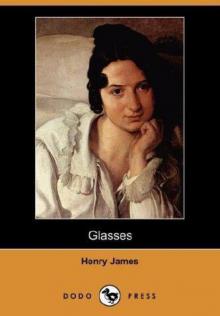 Glasses
Glasses The Princess Casamassima
The Princess Casamassima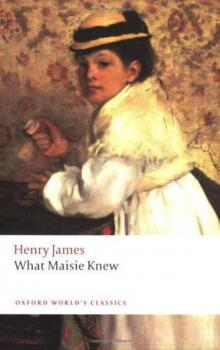 What Maisie Knew
What Maisie Knew The Reverberator
The Reverberator The Golden Bowl - Complete
The Golden Bowl - Complete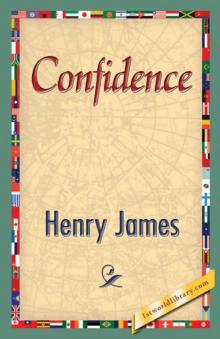 Confidence
Confidence Wings of the Dove (Barnes & Noble Classics Series)
Wings of the Dove (Barnes & Noble Classics Series) The Spoils of Poynton
The Spoils of Poynton